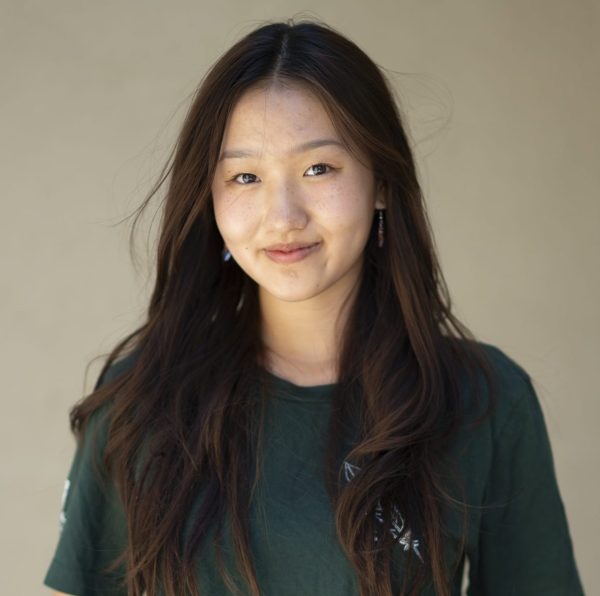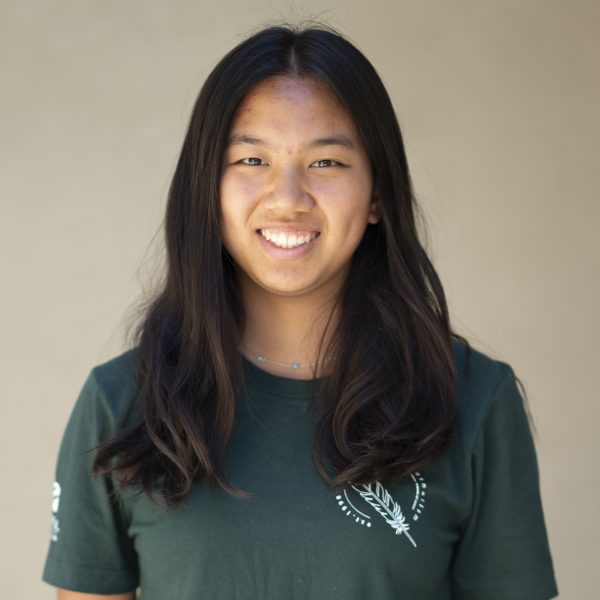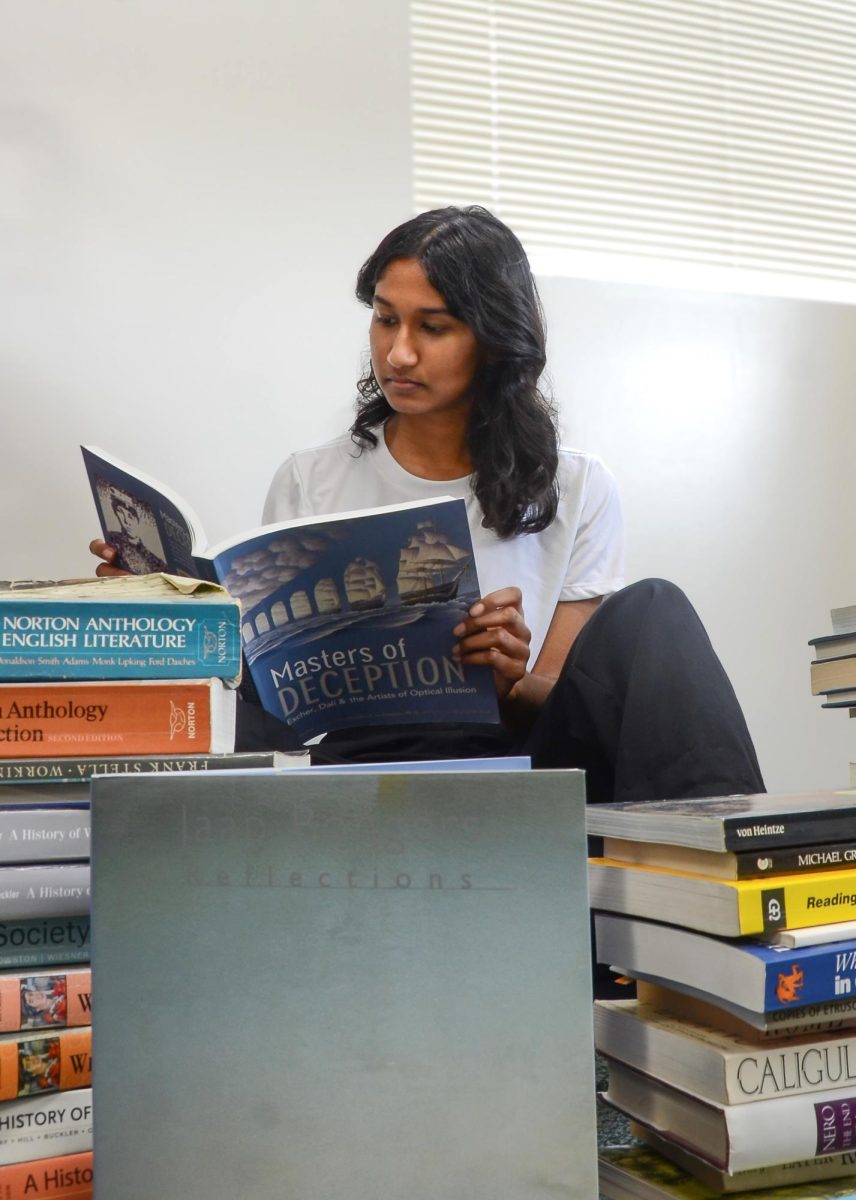Humans of Harker: Hitting escape
Amrita Pasupathy empathizes with those around her
“I like to analyze both myself psychologically and just like things in general by trying to notice details. It’s helped me know myself better. I understand why I’m doing certain things, even if they aren’t the best thing, so I can work towards becoming a better person,” Amrita Pasupathy (’23) said.
Escapism: avoiding reality by engaging in entertainment and fantasy. In other words, a psychological escape that plucks readers from reality and leaves them immersed within a mystical world.
Imagine a fourth grade girl tucked into a chair as she flips through the pages of a book: eyes flickering back and forth, she traces the lines of the story, completely unaware of the class discussion happening behind her. This distinct memory from Amrita Pasupathy’s (‘23) elementary school English class serves as just one of many moments in which a book transported her into a new world.
When Amrita opens up a new book, she steps into another reality. Embarking on such adventures into fantasy, Amrita discovers the creativity in new cultures and perspectives.
“I’m the type of person who can read anything and think it’s good,” Amrita said. “You get to explore a bunch of other realities, and I think that’s nice.”
Books, especially historical ones, offer windows into the minds of people from the past. Amrita jumps on the chance to peer in: after engaging in lectures on the Renaissance in AP European History in her sophomore year, Amrita delved into Niccolò Machiavelli’s “The Prince,” an instruction guide for royals, intrigued by discussions on the work.
“I don’t read too much historical writing, [but] Ms. Gilbert had a copy in her room, so I thought, ‘Is it true that he is actually that cruel?’” Amrita said. “I read it, and it turns out he’s actually very reasonable for the time period. We have different standards now, so lots of things couldn’t be applied to the modern day and still be called fair practice.”
Through delving into works exploring the humanities, Amrita started to engage more in analytical discussions about these literary texts that translated to a newfound appreciation for art. In her AP Art History, she took an interest in studying various styles of art and examining the origins of each.
“I like doing the analysis and learning what really goes behind each piece because it’s not just them creating something out of nothing,” Amrita said. “There’s a lot of historical context, and a lot of visual elements come from styles that have already been developed.”
With this curiosity and attention to detail, Amrita listens empathetically to her friends. Close friend Aneesha Asthana (‘23) values Amrita’s critical thinking that adds depth to their daily conversations.
“She really knows what she’s doing, and she knows what she wants,” Aneesha said. “The way we analyze our lives is very similar, and we like bringing all of that analysis to when we meet up. One of my favorite parts of my relationship with her is how honest and analytical she is and how she brings [out] the more philosophical side of me.”
Amrita brings her meticulousness to her work in computer science, a field whose breadth of applications fascinate her. Upper school computer science teacher Susan King, who taught Amrita in her freshman year, noticed Amrita’s detail-oriented nature and willingness to take the time to ensure the accuracy of code.
“One of the characteristics of Amrita is that she is very detail oriented, so she will prove or read tests and really do a great job of checking for correctness, [which] requires a lot of paying attention to details,” King said. “And she’s willing to sacrifice some of her own time. Last year, she would actually grade after school, not during a free period.”
Amrita’s care for details also appears when planning activities with friends, channeling her creativity into creating a completely new experience. Close friend Ananya Bammi (‘23) observed this particular trait after hosting a joint birthday party during the summer.
“It was a really fun idea, but we were struggling on what to do,” Ananya said. “But she came up with this idea of doing a scavenger hunt. So she stayed up with me the night before, working on making fun clues for everyone. It shows her personality: she is very invested in her friendships, she cares a lot about them and she’s willing to put in the work.”
Identifying her personal strengths and growth through focusing time not only on her friends but also herself is a large part of Amrita’s understanding of herself and taking more risks. By analyzing moments when she feels anxious or happy, she found a way to develop a healthier mindset.
“I like to analyze myself psychologically and things in general by trying to notice details,” Amrita said. “It’s helped me know myself better. I understand why I’m doing certain things, even if they aren’t the best thing, so I can work towards becoming a better person.”

Ananya Sriram (12) is a co-managing editor for the Winged Post, and this is her fourth year on staff. This year, Ananya hopes to bond more with members...

Katelyn Zhao (12) is the co-editor-in-chief of Humans of Harker, and this is her fourth year on staff. Katelyn aims to honor each of the stories within...

Olivia Xu (12) is the co-editor-in-chief of Humans of Harker, and this is her fourth year on staff. She is excited to celebrate the Class of 2024 and collaborate...


















![“[Building nerf blasters] became this outlet of creativity for me that hasn't been matched by anything else. The process [of] making a build complete to your desire is such a painstakingly difficult process, but I've had to learn from [the skills needed from] soldering to proper painting. There's so many different options for everything, if you think about it, it exists. The best part is [that] if it doesn't exist, you can build it yourself," Ishaan Parate said.](https://harkeraquila.com/wp-content/uploads/2022/08/DSC_8149-900x604.jpg)




![“When I came into high school, I was ready to be a follower. But DECA was a game changer for me. It helped me overcome my fear of public speaking, and it's played such a major role in who I've become today. To be able to successfully lead a chapter of 150 students, an officer team and be one of the upperclassmen I once really admired is something I'm [really] proud of,” Anvitha Tummala ('21) said.](https://harkeraquila.com/wp-content/uploads/2021/07/Screen-Shot-2021-07-25-at-9.50.05-AM-900x594.png)







![“I think getting up in the morning and having a sense of purpose [is exciting]. I think without a certain amount of drive, life is kind of obsolete and mundane, and I think having that every single day is what makes each day unique and kind of makes life exciting,” Neymika Jain (12) said.](https://harkeraquila.com/wp-content/uploads/2017/06/Screen-Shot-2017-06-03-at-4.54.16-PM.png)








![“My slogan is ‘slow feet, don’t eat, and I’m hungry.’ You need to run fast to get where you are–you aren't going to get those championships if you aren't fast,” Angel Cervantes (12) said. “I want to do well in school on my tests and in track and win championships for my team. I live by that, [and] I can do that anywhere: in the classroom or on the field.”](https://harkeraquila.com/wp-content/uploads/2018/06/DSC5146-900x601.jpg)
![“[Volleyball has] taught me how to fall correctly, and another thing it taught is that you don’t have to be the best at something to be good at it. If you just hit the ball in a smart way, then it still scores points and you’re good at it. You could be a background player and still make a much bigger impact on the team than you would think,” Anya Gert (’20) said.](https://harkeraquila.com/wp-content/uploads/2020/06/AnnaGert_JinTuan_HoHPhotoEdited-600x900.jpeg)

![“I'm not nearly there yet, but [my confidence has] definitely been getting better since I was pretty shy and timid coming into Harker my freshman year. I know that there's a lot of people that are really confident in what they do, and I really admire them. Everyone's so driven and that has really pushed me to kind of try to find my own place in high school and be more confident,” Alyssa Huang (’20) said.](https://harkeraquila.com/wp-content/uploads/2020/06/AlyssaHuang_EmilyChen_HoHPhoto-900x749.jpeg)



